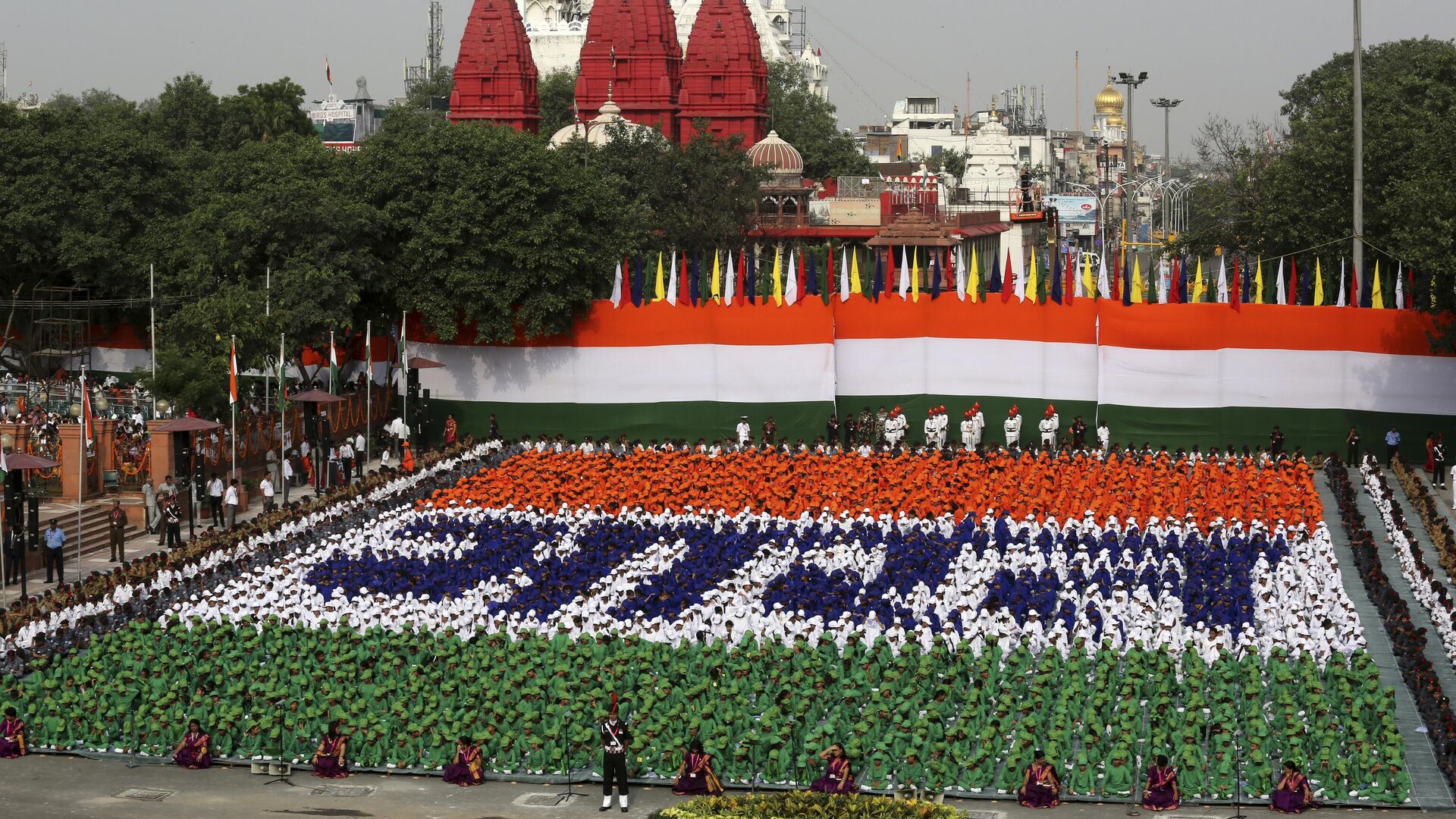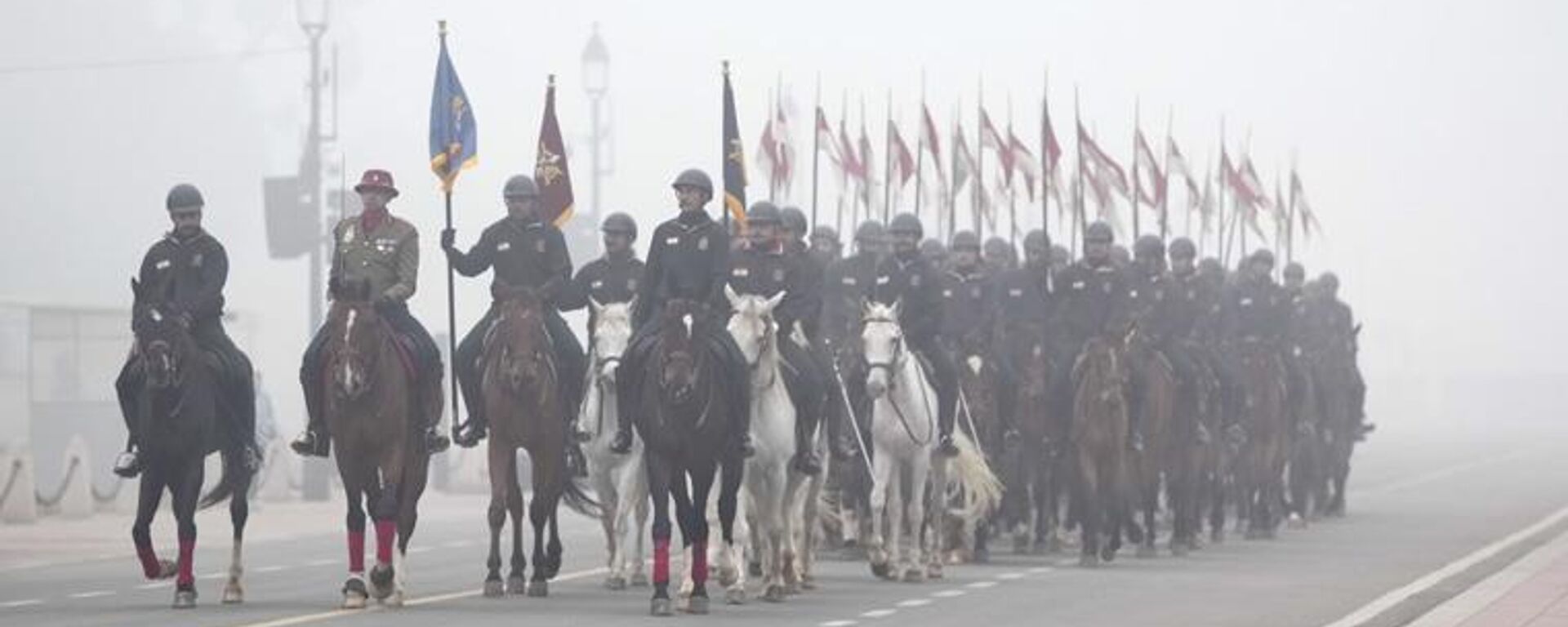https://sputniknews.in/20231231/how-india-showed-resolve-in-past-turbulent-year-5911515.html
How India Showed Resolve in Past Turbulent Year
How India Showed Resolve in Past Turbulent Year
Sputnik India
In 2023, India's foreign policy, adopted after Narendra Modi came to power, remained consistent, with the country unafraid to take a stand on key international issues.
2023-12-31T12:19+0530
2023-12-31T12:19+0530
2023-12-31T12:19+0530
s. jaishankar
narendra modi
india
russia
china
ministry of external affairs (mea)
pakistan
https://cdn1.img.sputniknews.in/img/07e7/09/0e/4241988_0:320:3072:2048_1920x0_80_0_0_650b16ced98bdfb38996da145919eff4.jpg
At 75, India appears confident in its independent foreign policy, even as it seeks to maintain good working relations with other world powers.Successive governments, irrespective of the political parties that led them at different times, have tried to maintain a balance with other countries while safeguarding India's interests.It may seem a little uncomfortable to some, but a country with the largest population has to protect its interests, because it has to look after its people.Whether navigating international efforts to combat global warming, fostering a positive working relationship with the US while maintaining ties with trusted allies such as Russia, or engaging in treaties that may not be in line with US preferences, India tactfully asserts its stance and prioritises national interests in every decision.This consistent approach has been upheld in recent years and will continue to be maintained in 2023.India Adopts Firm Stance, Expresses Views Directly One of the most recent examples of India's independent approach was when it continued to buy crude oil from Russia even after the US and other European countries imposed sanctions on it over its conflict with Ukraine.In August 2023, India was the second largest importer of Russian fossil fuels after China. From April to September, Russia was the largest supplier of oil to India, accounting for 40% of India's oil imports.Jaishankar also emphasised that Europe cannot prioritise its energy needs while demanding different actions from India. He asserted that discussions between India and Russia on expanding the trade portfolio had begun well before the Ukraine conflict.Similarly, the issue of Canada accusing India of killing Sikh separatist leader Hardeep Singh Nijjar on its soil is being handled without any fear on India's part.India made its position clear and rejected Canada's claim.This sparked a diplomatic row with both sides expelling diplomats and potentially destabilising trade talks.However, India has remained consistent on the issue. In keeping with its tradition of non-alignment, India has also moved forward.According to media reports, he accused Europeans of prioritizing their own affairs and losing sight of global issues. He stated that Western sanctions against Russia had pushed up energy, food, and fertilizer prices, causing acute economic problems in poorer countries. The Indian government is resisting this kind of bloc formation, he said.It's also no secret that India's foreign policy under Prime Minister Narendra Modi has become more assertive, and its voice carries weight on the global stage. Indian diplomats have been wary of bluntly calling out countries like Canada, Britain, and Australia for deliberately turning a blind eye to anti-India activity in their countries.Looking at the past few years, one would realize that Modi and his foreign minister Jaishankar have never shied away from airing their sharp views when it comes to the national interest.There has also been a total change in India’s approach when it comes to dealing with immediate neighbors – Pakistan and China. India has been talking tough with Pakistan as it deals with cross-border terrorism. India’s approach on the issue has changed totally with the Modi government making it clear to Pakistan that talks and terror cannot go hand-in-hand.Similarly, in the border dispute with China, India has been very firm and has maintained constant vigilance on the higher reaches of the Line of Actual Control (LAC).
https://sputniknews.in/20231229/75th-republic-day-parade-rehearsals-commence-at-india-gate-kartavya-path-6009128.html
india
russia
china
pakistan
Sputnik India
feedback.hindi@sputniknews.com
+74956456601
MIA „Rossiya Segodnya“
2023
Sushil Kumar
https://cdn1.img.sputniknews.in/img/07e7/0a/14/4972259_0:0:613:612_100x100_80_0_0_f89d4c7eaa17d23ebb41934f3e07e508.jpg
Sushil Kumar
https://cdn1.img.sputniknews.in/img/07e7/0a/14/4972259_0:0:613:612_100x100_80_0_0_f89d4c7eaa17d23ebb41934f3e07e508.jpg
News
en_IN
Sputnik India
feedback.hindi@sputniknews.com
+74956456601
MIA „Rossiya Segodnya“
Sputnik India
feedback.hindi@sputniknews.com
+74956456601
MIA „Rossiya Segodnya“
Sushil Kumar
https://cdn1.img.sputniknews.in/img/07e7/0a/14/4972259_0:0:613:612_100x100_80_0_0_f89d4c7eaa17d23ebb41934f3e07e508.jpg
irrespective of the political parties, common approach during the recent years, ministry of external affairs, foreign policy
irrespective of the political parties, common approach during the recent years, ministry of external affairs, foreign policy
How India Showed Resolve in Past Turbulent Year
In 2023, India's foreign policy, adopted after Narendra Modi came to power, remained consistent, with the country unafraid to take a stand on key international issues.
At 75, India appears confident in its independent foreign policy, even as it seeks to maintain good working relations with other world powers.
Successive governments, irrespective of the political parties that led them at different times, have tried to maintain a balance with other countries while safeguarding India's interests.
It may seem a little uncomfortable to some, but a country with the largest population has to protect its interests, because it has to look after its people.
Whether navigating international efforts to combat global warming, fostering a positive working relationship with the
US while maintaining ties with trusted allies such as
Russia, or engaging in treaties that may not be in line with US preferences, India tactfully asserts its stance and prioritises national interests in every decision.
This consistent approach has been upheld in recent years and will continue to be maintained in 2023.
The Ministry of External Affairs of the Narendra Modi government once said that India's diplomatic strategy is to engage all major centres of power and pursue multi-alignment to reflect the reality of multipolarity.
India Adopts Firm Stance, Expresses Views Directly
One of the most recent examples of India's independent approach was when it continued to buy crude oil from Russia even after the US and other European countries imposed sanctions on it over its conflict with
Ukraine.
"We've been very honest about our interests... It's my duty, my moral duty, to ensure that I get them (the people of India) the best deal I can," said Foreign Secretary S. Jaishankar, defending his country's decision to buy oil from Russia.
In August 2023, India was the second largest importer of Russian fossil fuels after
China. From April to September, Russia was the largest supplier of oil to India, accounting for 40% of India's oil imports.
Jaishankar also emphasised that
Europe cannot prioritise its energy needs while demanding different actions from India. He asserted that discussions between India and Russia on expanding the trade portfolio had begun well before the Ukraine conflict.
Similarly, the issue of Canada accusing India of killing Sikh separatist leader Hardeep Singh Nijjar on its soil is being handled without any fear on India's part. India made its position clear and rejected Canada's claim.This sparked a diplomatic row with both sides expelling diplomats and potentially destabilising trade talks.
However, India has remained consistent on the issue. In keeping with its tradition of non-alignment, India has also moved forward.
Jaishankar, in an interaction with the press, made it clear that India still sees the world order as too Western.
According to media reports, he accused Europeans of prioritizing their own affairs and losing sight of global issues. He stated that Western sanctions against Russia had pushed up energy, food, and fertilizer prices, causing acute economic problems in poorer countries. The Indian government is resisting this kind of bloc formation, he said.
It's also no secret that India's foreign policy under Prime Minister Narendra Modi has become more assertive, and its voice carries weight on the global stage. Indian diplomats have been wary of bluntly calling out countries like Canada, Britain, and
Australia for deliberately turning a blind eye to anti-India activity in their countries.
Looking at the past few years, one would realize that Modi and his foreign minister Jaishankar have never shied away from airing their sharp views when it comes to the national interest.
There has also been a total change in India’s approach when it comes to dealing with immediate neighbors –
Pakistan and China. India has been talking tough with Pakistan as it deals with cross-border terrorism. India’s approach on the issue has changed totally with the Modi government making it clear to Pakistan that talks and terror cannot go hand-in-hand.
... The fact is that we can't allow terrorism to be normalised. We cannot allow that to become a basis for discussion with Pakistan," Jaishankar said, adding that "unless this policy of cross-border terrorism is abandoned, it is clearly not possible to have a normal relationship.
Similarly, in the border dispute with China, India has been very firm and has maintained constant vigilance on the higher reaches of
the Line of Actual Control (LAC).



